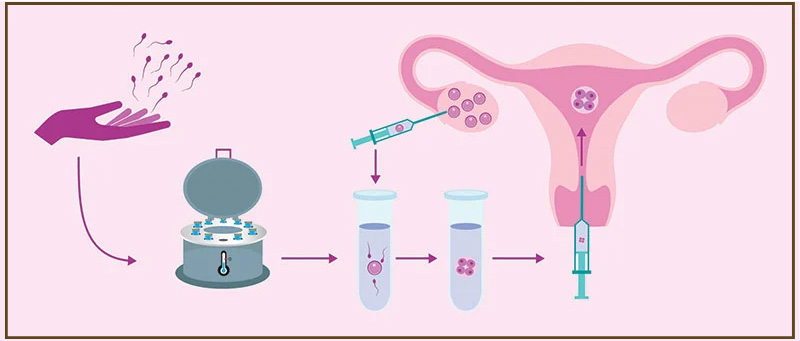As intended parent plans their surrogacy journey, they often misunderstand and misinterpret the importance of a surrogacy contract. While having a surrogacy contract gives you some kind of safety about your legal rights during surrogacy in Ukraine, it also plays a key role towards the success of your surrogacy journey. In the following parts of the blog, we will take a walkthrough towards what a surrogacy contract is and under what situations does it come relevant for your surrogacy journey.
What is a Surrogacy Contract?
A surrogacy contract can be defined as a legal agreement between the intended parents and the surrogate mother in Ukraine. Moreover, this contract is an essential element of surrogacy, outlining the rights, responsibilities, and expectations of all parties involved. That said, the contract must entail the following details :
Number of people involved: The contract identifies all parties involved in the surrogacy agreement, typically including the intended parents, the surrogate, and in some cases, the surrogate’s spouse or partner.

Medical services: The contract further outlines the medical procedures involved in the surrogacy process, from the initial medical screening and embryo transfer to prenatal care and the birth process. Also, it should clarify that the surrogate mother in Ukraine consents to these procedures and agrees to prioritize the health and well-being of the baby.
Financial clauses: The contract must also stipulate all financial arrangements, including the surrogate’s compensation, payment schedule, and who is responsible for medical and ancillary expenses. This can further cover life insurance for the surrogate and provisions for unexpected medical costs or complications.
Rights and Responsibilities: The contract also defines the rights and responsibilities of all parties. For instance, it affirms the intended parents’ legal parentage of the child and their responsibility to care for the child, regardless of health conditions or other unforeseen circumstances. Similarly, it underscores the surrogate’s commitment to prioritize the well-being of the child and her agreement to relinquish any parental rights to the child.
 Risk and Contingencies: The contract should also address various risk scenarios and contingencies. This includes how to handle multiple pregnancies, the possibility of selective reduction, or the decision to terminate the pregnancy due to medical reasons.
Risk and Contingencies: The contract should also address various risk scenarios and contingencies. This includes how to handle multiple pregnancies, the possibility of selective reduction, or the decision to terminate the pregnancy due to medical reasons.
Counselling for the surrogate: The contract may also include the provision for psychological support for both the surrogate mother and the intended parents, recognizing that surrogacy can be an emotionally complex process.
Post-Birth procedures: The contract also outlines the plans for after the child’s birth, including the surrogate’s agreement to hand over the baby to the intended parents and arrangements for the surrogate’s postnatal care.
Legal aspects: Lastly, the contract states which jurisdiction’s laws will govern the agreement, important in case of legal disputes that arise during or after the surrogacy process. So, as you will be pursuing surrogacy in Ukraine, the contract should be defining the surrogacy laws in Ukraine.
So, we can say that a surrogacy contract is the legal bedrock of the surrogacy process, providing clarity, protection, and guidance for everyone involved. Also, given its complexity, such a contract should be drawn up with the help of experienced attorneys who specialize in assisted reproductive law, to ensure all parties’ rights and interests are adequately represented and protected.
Under what circumstances a surrogacy contract must be enforceable?
Surrogacy, the process in which a woman agrees to carry and deliver a child for another person or couple, can come as a potent solution to numerous reproductive challenges. However, the legal, ethical, and emotional complexities surrounding it present a list of considerations when debating its enforceability. Moreover, as society continues to grapple with these issues, a consensus forms that surrogacy contracts should be enforceable under specific, well-defined circumstances to ensure the welfare of all parties involved.
Consent of every party is a must
Firstly, surrogacy contracts should be enforceable when all parties involved have given their informed and voluntary consent. Also, central to the ethics of any medical procedure is the concept of informed consent, ensuring that the surrogate fully understands the medical implications, the potential risks, and the contractual obligations before agreeing to bear a child for someone else. Also, the intended parents must understand the legal, financial, and emotional consequences that could arise from the surrogacy agreement.
Focus on healthcare and support
Secondly, the enforceability of surrogacy contracts should hinge on the provision of adequate healthcare and support for the surrogate mother in Ukraine. Also, ensuring the health and well-being of the surrogate is non-negotiable. Besides, the contract should stipulate comprehensive prenatal and postnatal care, psychological support, and adequate compensation for the surrogate mother. Moreover, by including these elements within the enforceability purview, we can ensure the protection and respect of the surrogate’s rights and welfare.
Surrogate rights should be respected
 Thirdly, the surrogate’s right to autonomy should be respected and maintained throughout the process. While the surrogate mother agrees to carry a pregnancy for another party, she retains the rights to her body and its care. Therefore, the enforceability of surrogacy contracts should not infringe upon her autonomy to make medical decisions, including the right to terminate the pregnancy if necessary for her physical or psychological well-being. That said, any contract that overrides these rights should be deemed non-enforceable.
Thirdly, the surrogate’s right to autonomy should be respected and maintained throughout the process. While the surrogate mother agrees to carry a pregnancy for another party, she retains the rights to her body and its care. Therefore, the enforceability of surrogacy contracts should not infringe upon her autonomy to make medical decisions, including the right to terminate the pregnancy if necessary for her physical or psychological well-being. That said, any contract that overrides these rights should be deemed non-enforceable.
The rights of the intended parents
The intended parents’ rights and responsibilities also factor into the enforceability of surrogacy contracts. That said, these contracts should legally bind them to assume parental rights and responsibilities for the child, regardless of any unexpected circumstances such as divorce, financial instability, or the child being born with a disability. Enforceability under these circumstances assures that no child born of a surrogacy agreement is left without legally accountable guardians.
Keeping the best interests of the child on priority
Lastly, the best interests of the child must be paramount in determining the enforceability of surrogacy contracts. Moreover, this principle, central to family law globally, should be explicitly incorporated into surrogacy agreements. While it is complicated to define what exactly constitutes the “best interest” of a child not yet born, the contract should stipulate that the child will not be exploited, commodified, or otherwise subjected to any form of harm or discrimination.
Final words
In a nutshell, surrogacy contracts should be enforceable when they uphold informed and voluntary consent, ensure the health and well-being of the surrogate, respect the surrogate’s autonomy, bind the intended parents to their responsibilities, and, most importantly, protect the best interests of the child. Also, these considerations, grounded in principles of human rights, bioethics, and child welfare, provide a robust framework for assessing the circumstances under which surrogacy contracts should be enforceable.
Moreover, as society evolves, our understanding and regulation of complex reproductive technologies like surrogacy should also evolve. Besides, it is imperative that we continue to engage in this dialogue, reevaluating and refining these conditions as new challenges and insights emerge. By doing so, we can strive towards a future where surrogacy can be practised safely, ethically, and to the benefit of all parties involved.



No Comments